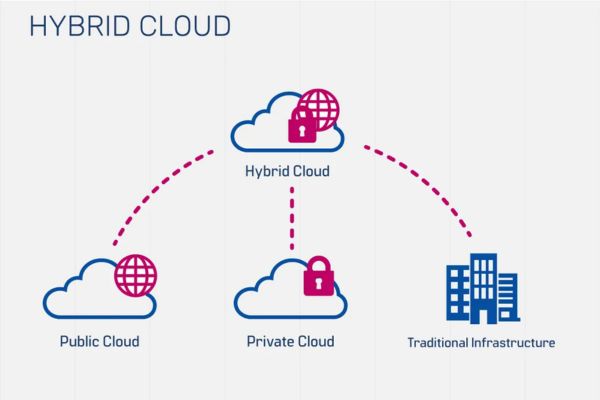According to Precedence Research, the global hybrid cloud market size is predicted to reach around USD 578.72 billion by 2034 increasing from USD 114.10 billion in 2024, with a CAGR of 17.63%.
Hybrid Cloud Market Key Insights
- North America accounted for the largest market share of 40% in 2024.
- By region, Asia Pacific is expected to experience the fastest growth during the forecast period.
- By component, the solution segment emerged as the market leader in 2024.
- By component, the services segment is projected to grow at the highest pace in the coming years.
- By service model, the Software as a Service (SaaS) segment led the hybrid cloud market in 2024.
- By service model, the Platform as a Service (PaaS) segment is anticipated to register substantial growth from 2025 to 2034.
- By enterprise size, large enterprises dominated the market in 2024.
- By enterprise size, small and medium-sized enterprises (SMEs) are expected to expand at the fastest rate during the forecast period.
- By end-user, the BFSI sector held the leading share in 2024.
- By end-user, the IT & Telecom sector is projected to grow at the highest rate between 2025 and 2034.
The Transformative Role of AI in the Hybrid Cloud Market
Artificial Intelligence (AI) is significantly enhancing the capabilities of the hybrid cloud market by optimizing resource management, improving security, and enabling smarter automation. Through AI-driven analytics, organizations can dynamically allocate workloads across public and private clouds, ensuring better performance and cost-efficiency. AI also plays a critical role in monitoring infrastructure health, predicting system failures, and automating routine maintenance tasks, which helps reduce downtime and operational overhead.
Additionally, AI strengthens data security and compliance in hybrid environments by detecting threats in real-time, automating responses, and ensuring governance across different platforms. It also empowers faster decision-making by processing and analysing large volumes of data spread across multiple cloud environments. As businesses continue to adopt hybrid cloud models, AI is becoming essential for achieving scalability, resilience, and operational agility.
What is Hybrid Cloud?
A Hybrid Cloud is a computing environment that combines private cloud (on-premises or dedicated infrastructure) and public cloud (like AWS, Azure, or Google Cloud) services, allowing data and applications to move seamlessly between them. This setup provides businesses with greater flexibility, scalability, and control over their IT resources.
Key Features of Hybrid Cloud:
- Flexibility & Scalability: Allows organizations to scale workloads across private and public clouds based on demand.
- Cost Efficiency: Optimizes costs by running sensitive workloads on private infrastructure and less critical ones on public clouds.
- Improved Security & Compliance: Keeps critical data in a secure private cloud while leveraging public cloud for less-sensitive operations.
- Business Continuity: Enhances disaster recovery and backup strategies by enabling data replication and workload distribution.
- Optimized Performance: Uses AI and analytics to distribute workloads for better performance and reliability.
Use Cases:
- Enterprises with legacy systems that want to modernize without a full migration.
- Organizations needing data sovereignty or industry compliance.
- Businesses with variable workloads, such as e-commerce platforms or financial services.
- Companies aiming for cost optimization and faster innovation cycles.
Regional Outlook of the Hybrid Cloud Market
North America
North America continues to dominate the global hybrid cloud market, holding the largest market share as of 2024. The region’s leadership is primarily driven by its robust digital economy and its status as an early adopter of advanced technologies such as cloud computing and the Internet of Things (IoT).
The United States is a major contributor, with a market size of USD 41.08 billion in 2024, projected to surge to approximately USD 212.12 billion by 2034 at a CAGR of 17.84%. The presence of leading cloud service providers like Amazon Web Services (AWS) and Microsoft Azure, along with their ongoing expansion efforts, further accelerates hybrid cloud adoption. North American enterprises are leveraging hybrid cloud solutions to enhance operational efficiency, scalability, and data security, which is crucial for supporting their digital transformation initiatives.
Asia Pacific
Asia Pacific is poised to experience the fastest growth in the hybrid cloud market during the forecast period. The region’s rapid digitalization, expanding base of digital consumers, and increasing adoption of advanced technologies are key growth drivers. Notably, countries like China and India are emerging as strongholds for hybrid cloud deployment. In China, the integration of artificial intelligence and other digital technologies within businesses is fuelling demand for hybrid cloud solutions. India, on the other hand, is witnessing a significant shift toward cloud environments, particularly within the IT and BFSI sectors.
Government initiatives such as India’s Meghraj cloud computing project are playing a pivotal role in promoting cloud adoption, especially to accelerate e-services and optimize government IT spending. The proliferation of small and medium-sized enterprises (SMEs) across the region also contributes to the robust market expansion.
Europe
Europe represents a mature hybrid cloud market, characterized by steady adoption across various industries. The region’s focus on data privacy, regulatory compliance (such as GDPR), and digital transformation initiatives is driving organizations to opt for hybrid cloud solutions that offer both flexibility and control over sensitive data.
European enterprises are increasingly leveraging hybrid cloud to support innovation, enhance customer experiences, and achieve operational efficiencies while maintaining compliance with stringent data protection regulation
Market Scope
| Report Coverage | Details |
| Market Size by 2034 | USD 578.72 Billion |
| Market Size in 2025 | USD 134.22 Billion |
| Market Size in 2024 | USD 114.10 Billion |
| Market Growth Rate from 2025 to 2034 | CAGR of 17.63% |
| Dominating Region | North America |
| Fastest Growing Region | Asia Pacific |
| Base Year | 2024 |
| Forecast Period | 2025 to 2034 |
| Segments Covered | Component, Service Model, Enterprise Size, Industry Vertical and Regions |
| Regions Covered | North America, Europe, Asia-Pacific, Latin America, and Middle East & Africa |
Segmental Outlook of the Hybrid Cloud Market
Component Outlook
The hybrid cloud market is segmented into solutions and services. In 2024, the solutions segment held the largest market share, driven by businesses increasingly adopting hybrid cloud platforms for agility, scalability, and enhanced data control.
However, the services segment-especially managed and professional services-is expected to grow at the fastest rate. This is due to the complexity of integrating on-premises and cloud environments, which prompts organizations to seek expert assistance to streamline hybrid cloud deployment and management.
Service Model Outlook
Among service models, Software as a Service (SaaS) led the market in 2024. SaaS solutions are favoured for their cost-effectiveness, scalability, and ease of integration, making them attractive for businesses seeking flexible IT infrastructure.
Platform as a Service (PaaS) is projected to witness significant growth, as it enables organizations to efficiently develop, run, and manage applications without the burden of maintaining the underlying infrastructure.
Enterprise Size Outlook
Large enterprises dominated the hybrid cloud market in 2024, leveraging hybrid cloud for high flexibility, scalability, and robust data security. These organizations handle vast amounts of sensitive data and require efficient, secure solutions to manage and protect it.
Meanwhile, small and medium-sized enterprises (SMEs) are expected to grow at the fastest pace, as hybrid cloud offers them scalable, cost-effective IT infrastructure that supports their rapid digital transformation and evolving business needs.
End User Outlook
The BFSI (Banking, Financial Services, and Insurance) sector accounted for the largest market share in 2024, owing to its need for secure, scalable IT infrastructure to manage sensitive data and regulatory requirements. Hybrid cloud helps financial institutions enhance security, reduce costs, and improve operational efficiency.
The IT & Telecom sector is anticipated to grow the fastest, as these companies rely heavily on data-driven services and require flexible, scalable solutions to handle large volumes of data and deliver superior customer experiences.
Key Recent Advancements in the Hybrid Cloud Market
- March 2025 – Sangfor Technologies entered a strategic partnership with CITIC Telecom International CPC Limited, a wholly-owned subsidiary of CITIC Telecom International Holdings Limited. The collaboration aims to integrate Sangfor’s advanced technologies with CITIC Telecom CPC’s ICT capabilities to deliver innovative, secure, and compliant hybrid cloud services.
- April 2024 – Cadence unveiled its most comprehensive true hybrid cloud solution, designed to offer seamless data access and management. This solution empowers customers with the flexibility to move effortlessly between cloud, on-premises, and hybrid multi-cloud environments, all while utilizing a single data source—eliminating the need for IT team intervention.
- January 2024 – Hitachi Vantara, a subsidiary of Hitachi, Ltd. focused on data storage and hybrid cloud management, announced the next phase of its collaboration with Cisco. The partnership introduced a new suite of hybrid cloud services specifically developed to address the evolving data management challenges faced by modern enterprises.
Hybrid Cloud Market Companies
- NTT Communications Corporation
- SAP SE
- Microsoft Corporation
- Dell Technologies Inc.
- Tencent Holdings Limited
- Hewlett-Packard Enterprise Company
- Amazon Web Services, Inc.
- Broadcom Inc., Fujitsu Ltd.
- Atos SE
- Cisco Systems Inc.
- Google LLC (Alphabet Inc.)
- Alibaba Group Holding
- Teradata
- Telstra Group Limited
- Huawei Technologies Co., Ltd.
- T-Systems International GmbH
- Tata Consultancy Services Limited
- Oracle Corporation
- IBM Corporation
Source: https://www.precedenceresearch.com/hybrid-cloud-market

















